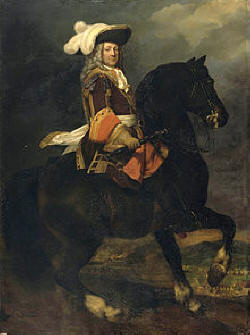 Louis Joseph de Bourbon, Duke of Vendôme (Louis Joseph; 1 July 1654 – 11
June 1712) was a Marshal of France and one of the most successful French
military commanders during the War of the Grand Alliance and War of the
Spanish Succession.
Louis Joseph de Bourbon, Duke of Vendôme (Louis Joseph; 1 July 1654 – 11
June 1712) was a Marshal of France and one of the most successful French
military commanders during the War of the Grand Alliance and War of the
Spanish Succession.Queer Places:
Royal Seat of San Lorenzo de El Escorial, Av Juan de Borbón y Battemberg, 28200 San Lorenzo de El Escorial, Madrid, Spagna
 Louis Joseph de Bourbon, Duke of Vendôme (Louis Joseph; 1 July 1654 – 11
June 1712) was a Marshal of France and one of the most successful French
military commanders during the War of the Grand Alliance and War of the
Spanish Succession.
Louis Joseph de Bourbon, Duke of Vendôme (Louis Joseph; 1 July 1654 – 11
June 1712) was a Marshal of France and one of the most successful French
military commanders during the War of the Grand Alliance and War of the
Spanish Succession.
Born in Paris in wealthy surroundings as the illegitimate great-grandson of king Henry IV of France, Vendôme joined the French Army at the age of 18 and rose through the ranks to become Lieutenant General in 1688 after his distinguished combat record in the Franco-Dutch War. Further excellence as a subordinate commander during the Nine Years' War gave him his first army command in 1695 and in 1697 he captured Barcelona in an audacious siege, being rewarded by Louis XIV with a promotion to Marshal soon after. In 1702, he assumed command of the French army in Italy during the War of Spanish Succession. He conquered most of the territory taken by Prince Eugene of Savoy's Austrian army the previous year. Vendôme fought Eugene to a draw at Luzzara (1702), and defeated him at Cassano (1705). In 1704 and 1705 he conquered large parts of Piedmont-Savoy, capturing Vercelli, Ivrea and Verrua. At Calcinato (1706), Vendôme routed the Imperial army in Italy and drove it to the eastern side of the Adige river.
Called to Flanders to face the Allied army under the Duke of Marlborough, Vendôme in 1707 kept Marlborough at bay and in 1708, under the nominal command of the Duke of Burgundy, went over to the offensive, capturing Ghent and Bruges and taking Marlborough by surprise. A great battle followed between the opposing armies at Oudenarde, where the half-deployed French army lost one-fifth of its strength in a major defeat due in large part to the command disagreements of Vendôme and Burgundy. Vendôme was replaced as the commander of the French Flanders army in 1709 and retired to his estates. In 1710, he was recalled to service and took up command of the 25,000-strong French army at the Pyrenees. Moving south with great speed, Vendôme caught the Allied forces retreating from Madrid to Barcelona by surprise and inflicted two major defeats on them at Brihuega and Villaviciosa. A ruthless pursuit reduced the 20,000-strong Allied army to 6,000 men. The Duke's crowning achievement secured the Spanish throne for his cousin Philip V. Vendôme died less than two years later on 11 June 1712.
Vendôme was one of the most aggressive and successful French army commanders during the wars of Louis XIV. His charisma, courage and skill won him the loyalty of his troops and the Spanish crown for the House of Bourbon.
He married Marie Anne de Bourbon (1678–1718), a daughter of Henri Jules, Prince of Condé and granddaughter of Le Grand Condé.
Reputedly very ugly, her father died leaving her unmarried. Her brother, who became the Prince of Condé in 1709, died the next year not having helped his sister marry. She could have married the duc du Maine in 1692, but Maine preferred Marie Anne's sister, Anne Louise Bénédicte de Bourbon, and married her instead.
The marriage ceremony occurred at the chapel at the Château de Sceaux on 21 May 1710. Sceaux was the residence of Anne Louise Bénédicte. Louis Joseph was fifty-five years old at the time. He was a Marshal of France and had been designated as the heir of his cousin, King Philip V of Spain. In the event that Philip should die childless, the House of Bourbon had decided that Louis Joseph would become the next king of Spain. The marriage remained childless though. This may have been due to the homosexual tendencies of her husband.[2] Marie Anne died in 1718 without any children.
Although Louis XIV had given permission for the marriage, the manipulative duc and duchesse du Maine hurriedly arranged the details of the wedding, probably for mercenary reasons. Even though the Dowager Princess of Condé was not informed of the marriage, she was present at the bedding ceremony at Sceaux along with Louis Henri, Duke of Bourbon; his wife Marie Anne de Bourbon;[3] the Dowager Princess of Conti and her children the Prince of Conti and Mademoiselle de La Roche-sur-Yon.
On his death, Louis Joseph left his wife the Duchy of Étampes and its lands. She held this title in her own right. When she died, it went to her niece, the Princess of Conti.
My published books: